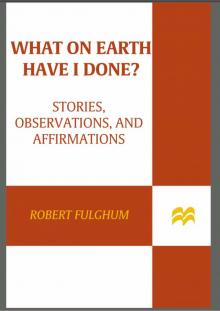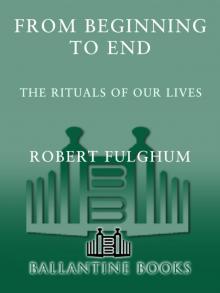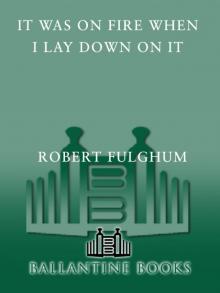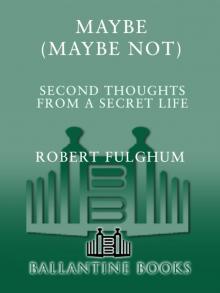- Home
- Robert Fulghum
Maybe (Maybe Not) Page 6
Maybe (Maybe Not) Read online
Page 6
For most of my life, I have known very few people with my last name, Fulghum (full-jum). My immediate family was small and died off early, leaving me the last apple on this branch of the family tree. As a result of recent genealogical research on the part of several distant relatives, it became clear that anybody with our last name was kinfolks. For the last several years we have held a national reunion. There are enough Robert Fulghums to form a baseball team.
As you might expect, as we have assembled our family tree, much attention is paid to the more famous figures of the past to whom we are supposedly related. Viking sea-rovers, kings, crusaders, knights, dukes, and those who accompanied conquerors and invaders hither and yon.
But I’m not really so sure we should be so proud of all of these guys. Weren’t they greedy pillagers and plunderers who made war on innocent people? Weren’t they feudal landlords who oppressed the peasants? Weren’t they migrant exploiters looking for something for nothing?
And how about the women—it bothers me that the great women are left out of the family hall of heroes.
In addition to the exemplars, I’d also bet our family has had its share of chowderheads, liars, chicken thieves, pickpockets, cowards, bad cooks, and fools.
The truth is, the great majority of those whose genes we bear were pretty ordinary folks. They stayed at home and minded their own business, thus we don’t know their names or much about their lives. They were more like us present-day Fulghums than the headliners across the centuries.
I wonder what it was like, back there in the good old days.
I imagine me in April 992, a thousand years ago.
The tenth century. A century in the middle of what modern historians call the Dark Ages. A century whose only illumination was sun, moon, lightning, fire, and starlight. Whose only source of power was human or animal muscle and falling water. My name would be something like Robert the Crazy-Legged (Norman French: fol-jambe).
Likely I would have spent the night sleeping on the floor on filthy straw, wrapped in lice-ridden cloaks, in the same room with my wife, nine children, three brothers, one sister, my mother-in-law, my great-aunt, and several orphaned children.
I live in a connected series of mud-and-wattle huts, also shared at night with two cows, two pigs, some ducks, chickens, and several dogs.
I have been awakened by a chicken pecking vermin off the rags wrapped around my head.
After breakfast of hard, stale, dirt-colored bread and a gray gruel, I will go out in the same clothes I slept in to the fields of the lord of the domain and push a board plow all day in the rain; records show it rained a great deal in the tenth century. It will take two of my sons and my wife to pull the plow through the sodden fields. My thoughts are not particularly noble.
“When do I eat?”
“I think I will kick the chickens.”
“It is raining again.”
“I am sick and tired.”
“Let’s eat a chicken.”
Every day I worry that at any moment I will be swept up in some small war that is always going on in the neighborhood, or that armed brigands will carry away my livestock or my wife and children.
Every day I worry that the lord of the domain will call me up to fight and die somewhere, or else will send his men to collect even more of his share of my crops than had been agreed.
I work until dark, six days a week, fifty-two weeks of the year, with no vacation or sick leave.
At night, I and my kinfolk huddle around the smoldering fire of wet wood, scratch flea bites, pick lice, eat gruel, and wonder why everybody in the huts across the river died last week.
I will lie down again in my clothes in exhausted sleep, hungry, as I have for as long as I can remember. Not starving, just hungry.
No doctor or dentist is available to me. I can’t read or write or do arithmetic. Sex and elimination are urges that are satisfied where and when they occur.
On Sunday, because it is required, I trudge off to the small chapel several miles away to hear a sermon of hellfire and damnation. I can believe in the wrath of an angry God—my daily life is a continual reminder that I must have fallen from grace. Famine, flood, drought, plague, pestilence, taxes, war, filth, and an early death are as constant as the coming of another day.
After holy services, I might find a friend who has a hogshead of sour beer, get drunk, and brawl with sticks until I get knocked into a ditch, am fined, and am dragged home by the bailiff, to awake to another day with a chicken pecking at my head.
This life is a narrow, brutish struggle for daily existence, with all my human energies exhausted in the mere attempt to stay alive. Yet I actually have a better life than many.
Things are fairly simple and uncomplicated, if that’s any use.
I do not have to worry about the meaning of life or the events of the world beyond what I can see from my front door. The church has explanations for every question that might arise in my simple mind. And I believe it’s true that someday I will go to heaven, where everything will be quite wonderful. There are no chickens in heaven, or so I am told and so I am glad to believe.
And I will not have long to wait until heaven. Forty years is a very long life in the tenth century. Most likely I will be gone before that—from starvation, infection, plague, war, or just the wear and tear of it all.
My gene strain survived those hard times.
The famous relatives back there don’t impress me nearly as much as those nameless, hang-tough members of the family who survived on sheer grit. I’m proud to be their heirs.
I think of them when I get knocked down by circumstances in my own life.
And I get up and go on again, in the memory of tough company, for the sake of those who come after me.
Inner conversations with myself—between me and my dummy—and me and my committee—are often confusing to me. They would be even more so to an observer. But these are the conversations that take place in that secret room where the hard work is done. I want to speak from there. Perhaps putting the conversations into a self-interview form will help:
“What’s the best meal you’ve ever eaten?”
“Chicken broth and saltine crackers.”
“Come on, get serious.”
“I kid you not. At a New Year’s party about ten years ago, I drank most of a bottle of Greek brandy—at the same time that I was unknowingly incubating the worst case of influenza I’ve ever had. By morning I had an O-God-help-me-help-me-and-I-won’t-ever-do-it-again hangover simultaneously with the Hong Kong flu. My head hurt so bad I moaned every time I moved. I spent hours in the shower throwing up and throwing down. My body ached so bad I cried. For four days, I thought I was going to die. I welcomed death.
“Late on the fifth night, I began to feel hungry. At three o’clock in the morning, I cautiously risked a teaspoonful of hot chicken broth and one saltine cracker. Yes…OK! Suddenly, I knew my ordeal was over. Anything going down was not coming back up.
“So I had a whole potful of chicken broth and a whole box of crackers. Nothing, nothing, ever tasted as good to me. Best meal I ever ate.”
“The best feelings in your life come when you start feeling good after you’ve been feeling just awful.”
“True for all crises—small and large.”
“Tell about a large one.”
“How about the time I tried committing suicide? Twenty-five years ago.
“A harsh time. Everything on my plate seemed foul and rancid—job, marriage, career, friendships, family life, and future.
“Ironic that I was a volunteer at the time on a twenty-four-hour answering service for a crisis center. Desperate people called in the middle of the night and said they were considering suicide. I resigned my post when I began to think they were on the right track. Getting dead began to seem like a good idea to me.”
“What did you do?”
“One morning—one Monday morning—I just ran away from home. Got in my car, drove to the airport, and caught the next
plane leaving. It was going to Texas, the last place I had in mind, but since Texas was where I grew up, probably the place I unconsciously wanted to be—back to the beginning—to complete the circle or find where things started going wrong—or something—I don’t know …”
“What did you do when you got there?”
“Tried to buy a gun, but there was a waiting period if you were from out of state. So shooting myself was out. Which was OK with me because I didn’t really want to shoot myself and make a mess somebody else had to deal with.”
“What next?”
“I looked for something to jump off of, but there wasn’t anyplace high enough in that part of Texas, and then there was the mess factor again.
“Two days had gone by. While I was working out the technical problems of getting dead, I was driving around in a rented car looking at the scenery of my childhood. If I told you what I was thinking, I’d be making it up. Because I don’t remember. It was a dream in a way and a serious review of my past in another, but words don’t apply—I was way down in the basement of my soul somewhere.
“My plan jelled. I bought a vacuum-cleaner hose and some wide masking tape. That night I drove out in the plains for a couple of hundred miles, turned off on a dirt road, and drove farther. I parked. Tried taping the hose to the exhaust pipe and then in through a wing window of the car.”
“What was going on in your mind then?”
“It felt like a contest between three people.
“One wanted to get it over with. Another seemed to think it was funny, and the third was obsessed with the taping problems, never mind the consequences. I remember the conversation, along the lines of—‘Can’t you hurry up,’ ‘He’ll never do it,’ and ‘The only problem is this tape you bought.’
“The trouble was that the hose was round and the exhaust pipe was oval, and I had to make the connection by using lots of tape to span the difference in shape. When I ran the engine, the heat of the exhaust melted the adhesive on the tape, and the hose fell off.
“It was funny. How absurd. Too dumb to do something so simple right. I was protected from myself by my own incompetence. I began to laugh. I couldn’t even kill myself. I laughed to the point of hysteria, which turned into sobbing grief, which turned into silence broken by renewed laughter. Maybe I could just sit here and die of stupidity. I could see the headlines. MAN MANAGES TO DUMB HIMSELF TO DEATH—SUCCUMBS TO EXHAUSTION BROUGHT ON BY TOO MANY FAILED ATTEMPTS TO DO AWAY WITH HIMSELF.
“Man too dumb to live—that’s me.
“But what if I had succeeded? I had this vision of my corpse sitting up at the wheel of this rented car out here in the bushes in the middle of nowhere—and the world going on without me—and it seemed like such a meaningless thing to do.
“And I began to think of my ancestors—considering that I was alive now because a lot of men and women before me had been able to take whatever life threw at them and go on. My genes had been through the Dark Ages, through the Black Death, across oceans to an unknown land, through wars and bad marriages and bankruptcy and all kinds of defeats that made my problems seem like a picnic. Toughness was permanently engraved on my genes. How could I give up here? How could I throw all that away?
“I began to laugh again. Death isn’t what I wanted. It wasn’t less life I wanted, but more life—life with meaning. And if I wanted something to laugh about, I had found that, all right: me, forever me—no bigger fool than I.
“And I never felt better in my life than at that moment. The best feeling in the world comes when you start feeling good again after you’ve been feeling awful.”
“So then what happened?”
“Returning home after running away to kill myself was really awkward. For one thing, I was in a great, exuberant, life-affirming mood. I felt like Lazarus after his resurrection.
“On the other hand, I had upset my family and friends, and I expected a stormy scene with my wife. Oddly enough, she was calm. On reflection, I suspect she probably had wished at times that I would just disappear or drop dead. When it seemed like that’s exactly what I’d done, she went through a reality check of her own.
“Her response was a complete surprise.
“She had bought me a glad-you-came-back-alive gift.
“A canary. A yellow, living, singing canary.
“I’m not a pet person. Yet here was this beautiful bird hanging in a brass wire cage in the window of my room—singing as though the joy itself were distilled in its song. How absurd! How wonderfully right. I remember shouting at it, ‘SING, BIRD, SING!’
“Within a year the marriage ended, and the bird escaped while its cage was being cleaned. But I’ll always love the mother of my children for the gift of empathetic grace in the form of that canary, which still sings in the sunniest window of my soul and welcomes me home from my ongoing bullfights.”
“Bullfights? What bullfights? Tell me about the bullfights.”
“When I was a young man, I accompanied my father on a business trip to Mexico. We went to the Plaza de Toros in Mexico City to see the bullfights. A wonderfully terrifying experience. And embarrassing. Experiencing in public the fear and blood and death and the mad energy of the crowd was too close to images of terror and loathing I had concealed in my nightmares and fantasy. I cried.
“This powerful experience has kept me attached to bullfighting over the years, though I have never again been to a live event. I’ve read many books, collected photographic essays, seen movies, and talked with afficionados and two professional matadors.
“It is not that I like bullfighting as such. But it’s the clearest metaphor I have in my mind for dealing with the dark, dangerous demon of death that runs loose in the arena of my mind from time to time.
“With experience and practice, one may increase the odds in favor of triumphing over the bull. I respect the bull. I know that even the best matadors come close to death. And sometimes—sometimes—the bull wins.
“My bull is the beast of self-destruction. I know he’s in there, always.
“But at age fifty-five, I am at the top of my form as a matador.
“I’m confident in the presence of the bull.
“This confidence is called ver llegar in the ring. It means ‘to watch them come.’ It is the ability to plant your feet exactly so—to hold your ground and see calmly, as in slow motion, the charge of the bull, knowing that you have what it takes to maneuver the bull safely by. This is dynamic stability. Standing still is one of the steps in dancing, as moments of silence are part of music. Confidence lies in the stillness. It is the confidence that comes from many passes and many fights—you can control the bull and defeat it because you have done it before.
“My bull comes at me when I have succumbed to examining my life with a microscope. Little mites become dragons under the lens, and fear makes me weak. Or the bull comes when I am hurriedly trying to collect and carry all the baggage of my life and haul it up the spiral staircase that leads to nowhere, and I despair of the absurdity of my life. The bull comes then. Because he thinks I welcome him as a kind of solution.
“I know him now. I can smell him, sense him before he moves. I welcome him. Yah, Toro, come on. I plant my feet and watch him come. He charges. I pass him safely by with a swing of the cape of my confidence. The crowd in my head roars. OLÉ! The crowd is made up of all those ancestors who passed their bulls—they are pulling for me. OLÉ! OLÉ! OLÉ!
“There is always a silence when the bull is defeated.”
“And in that silence, the bird in the window sings again?”
“Yes.”
In 1984 my wife and I shouldered our backpacks and set off on a five-month journey around the world. A dream come true. A wonder wander walkabout. The romantic anticipation came easy—the reality was often hard.
Traveling is anxious work. So much time is absorbed in just coping with the unfamiliar—with language, currency, local customs and officials, accommodations, and food. The trouble with “Getting Away fr
om It All” is that you indeed get away from it all—all those background comforts of home—as well as from the unconscious ease with familiar smells, sounds, and cultural patterns. Having all your mental systems on full alert for a long time is exhausting. One gets cranky. And two get even crankier.
Our adventure fatigue was relieved by an elephant ride in Thailand.
This came at the midpoint of our journey, when we were thinking, If we’re having such a wonderful time, why aren’t we having a wonderful time?
An acquaintance arranged for us to visit a forest reserve north of Chiang Mai where elephants are still used for all the heavy work of logging. We were to view the operation from elephant back. A shaky ladder was tilted against the side of an elephant. We cautiously climbed up and onto an equally shaky wooden platform strapped to the elephant’s back. The anxiety of getting on was matched by the anxiety of riding. We were a long way off the ground, and it felt as if we would be catapulted in that direction at any moment by the great lurching march of the beast.
When the ladder was raised again for us to get off, I noticed a small sign attached to the top step.
NOTICE: INSTRUCTIONS FOR DISMOUNTING FROM
ELEPHANT.
FIRST, COMPOSE YOUR MIND.
MUCH EASIER TO GET DOWN THAN UP.
In the ensuing years, much of that trip around the world has faded from conscious memory. But indelibly written in the operating instructions for my life is that admonition from the top rung of that ladder in Thailand. The instructions continued, concerning holding on with both hands and not poking the elephant. But it was that first line that spoke to me.
Even now, when I am about to make a move of consequence, small or large, a warning light flashes from the control panel in my head: “This is an elephant dismount.” And sometimes, sometimes, I actually manage to compose my mind.
Soccer Mania comes to our Seattle neighborhood every September.

 All I Really Need to Know I Learned in Kindergarten
All I Really Need to Know I Learned in Kindergarten What On Earth Have I Done?
What On Earth Have I Done? From Beginning to End
From Beginning to End It Was On Fire When I Lay Down On It
It Was On Fire When I Lay Down On It Maybe (Maybe Not)
Maybe (Maybe Not)